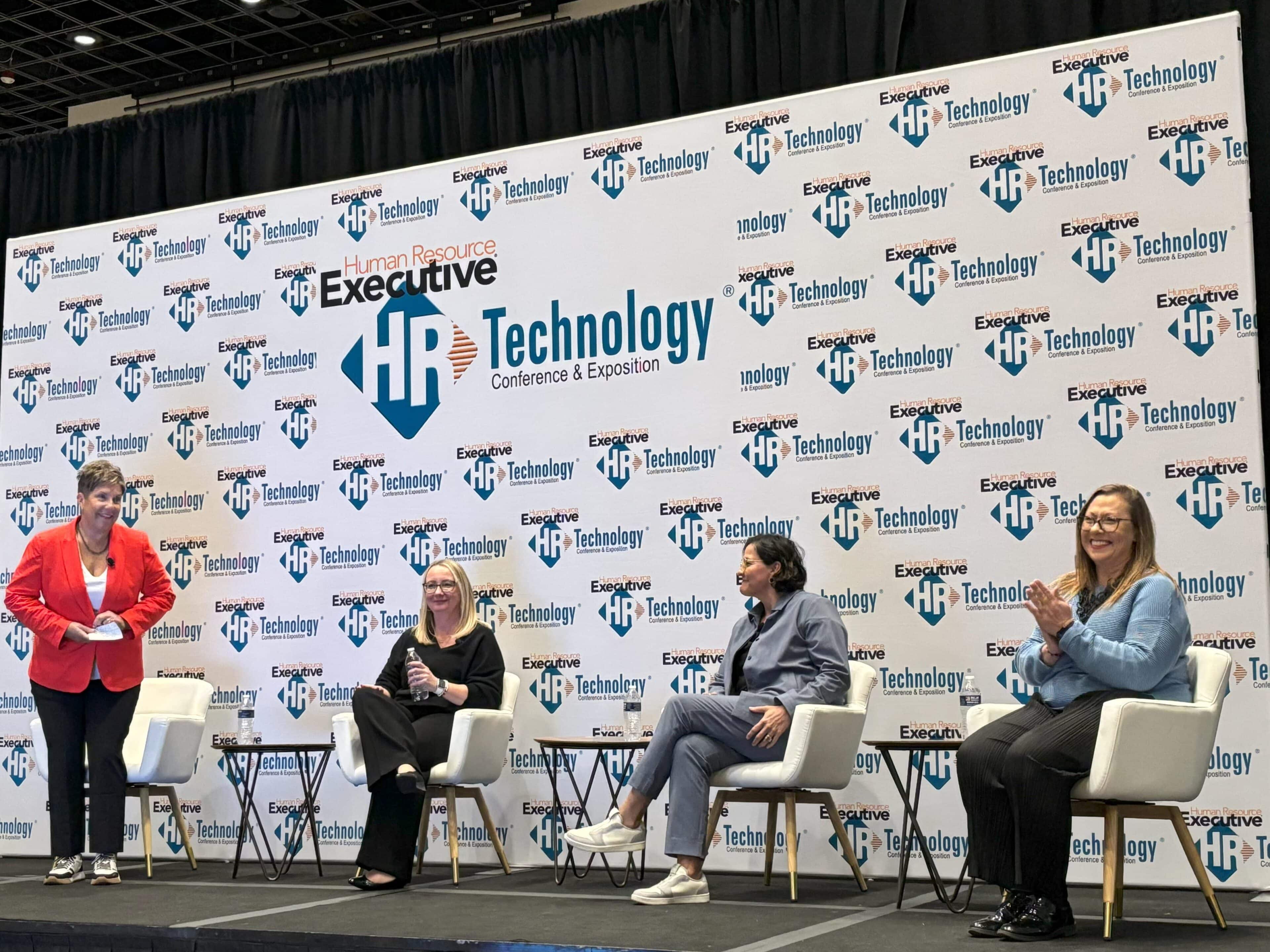
As HR leaders face challenges in adapting to the evolving world of work, integrating AI and other advanced technologies into talent acquisition processes has become a critical focus. With organizations striving to balance efficiency with a human-centered approach, recent debates around the responsible use of HR tech are more relevant than ever.
At the Women in HR Tech Summit in Las Vegas this week, three seasoned TA leaders—representing some of the most notable businesses in the U.S.—discussed how they balance tech with the irreplaceable value of human interaction in a closing keynote conversation.
While every TA tech procurement is unique to the organization, the speakers emphasized the universal importance of including recruiters in the AI implementation to ensure their buy-in and foster better adoption. “It’s critical to have the recruiters come with you,” said Joanna Clark, head of talent acquisition strategy and transformation at Wells Fargo. “They need to understand that “this is the cavalry; it’s not scary.”
This starts with identifying which technology recruiters will actually use and which tools will enhance both their work and the candidate experience. Recruiters need to know that their role remains valuable and that AI, when used effectively, allows more time for high-touch moments with candidates. When involving recruiters and staffing specialists in the process, it’s crucial to clearly define their roles, said Clark. “Often, they think they’re there just to listen and learn, which is partly true, but we really want their input,” she explained. “We need to understand what will make their jobs easier.”
During implementation, it’s important to actively engage recruiters, not just include them on teams. For example, when Clark brings recruiters into discussions, she’ll sometimes nudge them to ask questions and contribute. She’ll say, “That’s a great topic to raise,” which helps foster a more open dialogue. “Empowering them to feel like they have a voice is key because that’s exactly what we need from them.”
TA teams and the value of tech
The procurement process has evolved into a modern experience that requires HR teams to be more aware of technology. According to Clark, talent-related tech products have grown more complex, and buying new platforms isn’t an autopilot task.
Panelist Jennifer Tracy, vice president of talent attraction and acquisition at Spectrum, added that TA leaders must fully understand the platforms they choose to engage in the organization’s architecture. And Yvette Stortz, vice president of talent acquisition for CVS Health, emphasized that it’s essential for TA and HR teams to ask vendors tough questions, such as who assumes the risk if something goes wrong, how candidates will know they’re engaging with AI, and whether any third parties are involved in auditing.
“Vendors have become really clear about how this has changed the game,” Clark said, adding that they now ask what the customer needs and how they can support that. “The openness is critical.”
Don’t get stuck on past processes
Introducing new technology presents an opportunity to reassess current processes. Clark pointed out that layering new tech on top of outdated systems is a waste of money. Stortz agreed, saying, “Just because it’s the way it was always done doesn’t mean it’s the right business decision. Let’s forget about that and focus on the best process with the least amount of handoffs to create a great experience for candidates and managers.”
Drawing from personal experiences, the panelists, including moderator Barb Ruess, vice president of global operations at CareerXroads, shared insights on AI implementation challenges. Tracy advised flexibility, encouraging organizations to adjust timelines as needed to achieve better results and learn throughout the process. “Don’t be super grounded unless there is a business reason to do so,” she advised.
Manage stakeholder expectations
Tracy acknowledged that managing stakeholders, particularly in a decentralized environment, can be challenging. When her company, Spectrum, launched a new ATS last summer, her team assembled a council of 45 cross-functional representatives who were responsible for training their business units on the new system.
“Sometimes it’s about shifting the fulcrum further down to create better balance,” said Tracy. Why? Because those involved had bought into the tech and were motivated to help make the implementation a success. “They’ve invested a lot of time, energy and effort,” she added.
Tracy noted that her company only takes on one major HR or TA system implementation per year. “We ensure that we’re only doing one because too much change can disrupt change management,” she said. This might not be the standard for every organization, but knowing what the company can tolerate requires a deep understanding of the organization and careful vendor vetting to assess system flexibility.
Move from reports to problem statements
Clark shared that Wells Fargo is shifting from a focus on reporting to a deeper emphasis on analytics. “This is part of a two-year journey for us,” she said. “In the first year, we focused on gathering data and setting up a data warehouse to provide reliable, usable data.”
She noted a significant shift in how analytics are approached today, moving away from simply generating reports. Instead, her team now begins with a clear problem statement: What problem are we trying to solve? Then, data scientists and analytics experts are brought in to determine what the data should reveal.
Clark said this required significant change management, but once the focus shifted to problem-solving rather than just report generation, the conversations transformed. “We started learning much more about ourselves,” she said.
The discernment they gained came from asking the right questions and then finding the answers. “That’s the key shift we’ve seen in recent years—less focus on producing reports and more focus on asking meaningful questions to drive actionable insights,” said Clark.
